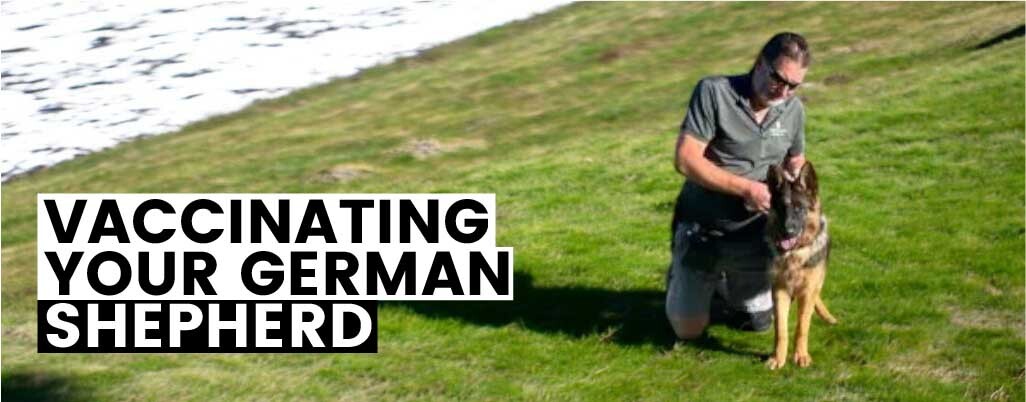
At Kempkes Executive, we understand the crucial role of vaccinations in preventing serious diseases. However, there is a growing conversation about the frequency and necessity of these vaccinations. Are we over-vaccinating our German Shepherds?
Our commitment to the well-being of German Shepherds drives us to discuss this important question and aim to explore the standard vaccination protocols recommended by trusted veterinary authorities and weigh them against the unique needs of German Shepherds. This approach ensures that our clients are informed and can make decisions that honor both the health and heritage of their dogs.
Let’s learn to maintain the delicate balance of providing optimal protection without overloading the immune system of our GSDs.
SUMMARY
- Importance of vaccinations in protecting German Shepherds from serious diseases while avoiding over-vaccination risks.
- Core and non-core vaccines and how to tailor the vaccination schedule to your GSD’s specific needs.
- Benefits of alternatives like titer testing to determine immunity levels reducing unnecessary booster shots.
- Signs of over-vaccination and knowing when to avoid or delay vaccines based on health history or specific life stages.
Why Vaccination is Important for German Shepherds?
Vaccinations are a cornerstone of preventive care for German Shepherds. They help protect against serious diseases that can spread quickly and even become fatal. Vaccination reduces the spread of contagious diseases in your dog.
CALL Michael and Jeannette Today!
Your Loyal German Shepherd is Just a Call Away – Purebred and Ready for Your Family!

Core Vaccines
Core vaccines are the ones that every German Shepherd should receive because they protect against the most dangerous and widespread diseases. These include:
- Canine Distemper (CDV): A highly contagious viral disease that affects a dog’s respiratory, gastrointestinal, and nervous systems.
- Canine Parvovirus 2 (CPV-2): A deadly virus that attacks the intestinal lining, causing severe vomiting and diarrhea. Puppies are particularly vulnerable to Parvovirus, which can be fatal without vaccination. A search article in ScienceDirect shows the efficacy of vaccination at 4 and 6 weeks in the control of canine parvovirus.
- Rabies: A viral disease that affects the central nervous system. It is always fatal, and vaccination is legally required in most areas.
Optional (Non-Core) Vaccines
Not every German Shepherd needs non-core vaccines, but these are recommended based on your dog’s lifestyle, environment, and risk factors:
- Bordetella (Kennel Cough): This vaccine is recommended for dogs that are boarded frequently or come into contact with many other dogs.
- Leptospirosis: This bacterial infection is spread through contaminated water and soil, posing a risk for dogs in rural or high-rainfall areas.
- Lyme Disease: Spread by ticks, this vaccine is suggested for dogs that live in areas with a high prevalence of Lyme disease.
Dr. Jean Dodds’ Protocol
Dr. Jean Dodds, a renowned veterinarian, has developed a vaccination protocol that challenges the traditional annual booster schedule. She advocates for fewer vaccines spaced out over more extended periods, considering that some vaccines provide long-term immunity. This protocol recommends that core vaccines be given less frequently and titer tests be used to assess a dog’s immunity levels before giving unnecessary booster shots.
Understanding the difference between core and non-core vaccines is essential, as non-core vaccines may not always be necessary and can contribute to over-vaccination if given too frequently.
What’s the Right Vaccination Protocol for German Shepherds?
A vaccination schedule ensures that your German Shepherd receives the right protection at the appropriate stages of life. The key is understanding the vaccination needs of puppies, adult dogs, and seniors, as each stage requires different protocols.
| Age (Weeks) | Vaccination | Notes |
|---|---|---|
| 6-8 weeks | Distemper, Parvovirus, Adenovirus | The first round of core vaccines. |
| 10-12 weeks | Distemper, Parvovirus, Adenovirus | The second round of core vaccines is Bordetella (if needed). |
|
14-16 weeks
|
Distemper, Parvovirus, Adenovirus, Rabies | The final round of core vaccines is the rabies vaccine (if required by law). |
| 12-16 weeks | Bordetella (Kennel Cough) | The final round of core vaccines is the rabies vaccine (if required by law). |
| 1 year | Booster for Distemper, Parvovirus, Adenovirus, Rabies | Boosters for core vaccines; assess non-core vaccines based on risk. |
| 1-3 year | Booster for core vaccines | Recommended every 1-3 years based on vet’s advice; consider titer tests. |
| Senior (7+ years) | Assessment of core vaccines | Consult your vet for any needed boosters or titer tests. |
German Shepherd Puppy Vaccination Schedule
Puppies are typically born with maternal immunity, passed on from their mothers through colostrum (the first milk). However, this immunity gradually wears off; vaccinations are essential to fill that gap.
Boosters may be required to protect your puppy, as maternal antibodies can interfere with vaccine efficacy during the early weeks.
Adult German Shepherd Dog Vaccination Schedule
Once your German Shepherd reaches adulthood, the need for frequent vaccinations decreases. However, booster shots are typically recommended every 1–3 years for core vaccines. Depending on exposure risk, your vet may suggest an annual schedule for non-core vaccines.
Consult your vet to tailor the vaccination schedule to your dog’s needs, avoiding unnecessary boosters for diseases your dog is not at risk for.
Senior German Shepherd Dogs Vaccinations
German Shepherds’ immune systems can weaken as they age, but that doesn’t necessarily mean more vaccines. Senior dogs often require fewer vaccines, especially if they have already built up immunity through previous vaccinations.
Regular blood tests or titer tests (which measure the level of antibodies) can help determine whether your senior dog needs additional vaccinations.
Signs You May Be Over-Vaccinating Your German Shepherd
While vaccines are critical for preventing disease, over-vaccination can adversely affect your German Shepherd’s health. Recognizing the signs of over-vaccination and understanding the potential risks involved is essential.
Over-vaccinating your German Shepherd dog results in immune system overload, which can lead to allergic reactions, autoimmune disorders, and even long-term health complications.
Some signs of over-vaccination include:
- Lethargy and fatigue: Your dog may become excessively tired or weak after receiving multiple vaccines quickly.
- Allergic reactions: The reactions range from mild (swelling, hives) to severe (anaphylaxis).
- Chronic inflammation: Over-vaccination causes chronic inflammation, which may lead to joint pain, skin issues, and other long-term conditions.
CALL Michael and Jeannette Today!
Ready for Your Home – Trained, Loyal Adult German Shepherds for Sale!

Potential Long-Term Health Consequences
Excessive vaccination has been linked to autoimmune diseases, where the immune system mistakenly attacks healthy cells. In some cases, over-vaccination may also increase the risk of cancerous tumors developing at the injection site. While these outcomes are rare, they highlight the importance of a balanced vaccination approach.
When Should You Avoid Vaccination of Your GSDs?
There are certain situations where it may be best to avoid or delay vaccinations:
1. During Estrus, Pregnancy, or Lactation
Vaccines can affect a dog’s hormonal balance and immune response. It’s generally recommended to avoid vaccinating female dogs while they are in heat, pregnant, or nursing puppies, as this can lead to complications.
2. Dogs with a History of Vaccine Reactions
If your German Shepherd has had a previous reaction to vaccines, it’s essential to discuss this with your vet. Sometimes, it may be necessary to avoid certain vaccines or space them out to reduce the risk of another reaction.
3. Homeopathic Nosodes
Homeopathic nosodes are sometimes suggested as alternatives for pet owners who want to avoid traditional vaccines. However, it’s important to note that there is limited scientific evidence supporting the efficacy of nosodes in preventing diseases.
Vaccines Not Recommended For GSDs
Certain vaccines may not be necessary or recommended for all German Shepherds, depending on their lifestyle, environment, and health history.
Some vaccines that might not be essential for your German Shepherd:
1. Canine Coronavirus
While the canine coronavirus vaccine exists, it’s not widely recommended because the virus typically causes only mild illness and is often self-limiting. Most healthy dogs recover on their own.
2. Giardia
The Giardia vaccine is generally not recommended for routine use. Giardia infections are usually treated with medication, and the vaccine’s effectiveness is questionable.
3. Rattlesnake Vaccine
This vaccine is primarily recommended for dogs living in areas with a high rattlesnake population. This vaccine may be unnecessary if your German Shepherd is not exposed to snakes.
4. Porphyromonas (Periodontal Disease)
This vaccine targets periodontal disease, but veterinarians do not commonly use or recommend it. Regular dental care and hygiene are usually more effective in managing dental health.
5. Leptospirosis (in low-risk areas)
While this vaccine is essential in high-risk areas, dogs in low-risk regions may not need it. Consult with your vet to determine whether your German Shepherd requires this vaccine.
Should You Consider Titers Instead of Boosters?
As mentioned earlier, titer tests can be valuable in assessing your dog’s immunity. Instead of automatically giving a booster, your vet can test your dog’s blood to see if they still have adequate immunity to core diseases.
Benefits of Titer Testing
If the titer test shows strong immunity, giving your German Shepherd another vaccine is unnecessary.
Although titer tests can be more expensive upfront than a vaccine, they can save you money in the long run by preventing unnecessary boosters and the potential costs of treating vaccine reactions.
FAQs
How many shots does a German shepherd need?
A German Shepherd puppy usually receives a series of core vaccinations, starting at 6-8 weeks, with boosters every few weeks until 16 weeks. After that, they need annual or tri-annual boosters depending on their health and exposure risks.
How often should I vaccinate my German Shepherd?
Vaccination schedules vary based on your dog’s age, health, and lifestyle. You may only need to administer core vaccines every few years, and you can use titer tests to determine if boosters are necessary.
What are the signs of a vaccine reaction?
Common signs include swelling at the injection site, lethargy, vomiting, and diarrhea. Severe reactions may include difficulty breathing, hives, or collapse, requiring immediate veterinary attention.
At what age do you stop vaccinating your dog?
Adult dogs typically continue to receive vaccinations throughout their lives, but veterinarians often reduce the frequency of booster shots after they reach senior age (around seven years and older). Consult your vet for titer testing to determine if additional vaccines are necessary for your senior dog.
Final Thoughts
A balanced vaccination protocol is essential to maintaining your German Shepherd’s long-term health. The key is avoiding over-vaccination while protecting your dog against serious diseases.
Factors such as your German Shepherd’s age, health history, and environment all play a role in deciding when and how often to vaccinate.
Every dog is unique, and its vaccination protocol should be, too. By staying informed, asking questions, and considering options like titer testing, you can ensure your dog gets the protection it needs without the risks of over-vaccination.






